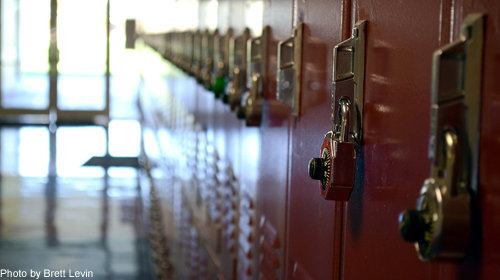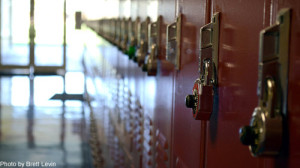We’re starting to get questions about the use of body cameras by “school resource officers,” a.k.a. police officers stationed in schools.
First of all, we don’t think that police officers should be routinely present in schools at all. Traditionally, police have not been involved in schools outside of genuine emergencies and serious crimes, but more and more police officers are being permanently stationed at schools. This contributes to the criminalization of many routine school disciplinary matters that have never before been handled through the criminal justice system, and the strengthening of what we call the school-to-prison pipeline.
Where officers are nevertheless based in schools, we don’t think they should be wearing body cameras. If they have been called in because of an imminent threat of some kind, and reasonably anticipate needing to use force, that might be a different story—but cops for whom a school is their beat should not be wearing cameras day in and day out.
As with body cameras worn by building inspectors, body cameras in schools just don’t strike the right balance in terms of oversight versus privacy.
To begin with, police officers, when in schools, should not regularly be engaging in the type of law enforcement efforts that would require them to wear body cameras. The activities of police, on the rare occasions when operating in schools is justified, should be closely and actively monitored by school officials, not by body cameras. My colleagues who work on these issues tell me there is a genuine need for increased accountability for the actions of police in schools—but what is needed are not cameras, but measures such as the collection of data on arrests, and MOUs between schools and police departments.
On the other side of the equation, body cameras present a real threat to students’ privacy and contribute to the creation of an environment in schools of pervasive surveillance, with all the bad lessons that creates for the future freedom-minded citizens that we want to mold. More likely than not, body camera footage is just going to be whipped out left and right for the enforcement of petty rules and disciplinary disturbances.
Body cameras, if done right, make sense for police in our communities. They do not make sense for police in our schools.


